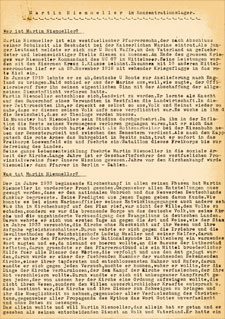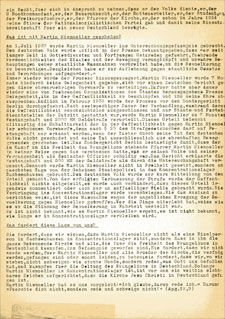Kurt Frör: Protest against Despotism
One of the most important theologians in the Bavarian Kirchenkampf was Pastor Kurt Frör (1905–1980). He had worked as dean of studies at the theological seminary in Nuremberg under Director Julius Schieder (1888-1964) since 1932. Having joined the Confessing Church early on, he was one of the founding members of the Bavarian Brotherhood of Pastors and maintained contacts with Martin Niemöller (1892-1984) and the Pastors’ Emergency League. Just like Regional Bishop Hans Meiser (1881-1956) and Julius Schieder, he was relieved of his office when the Bavarian regional church was forcibly incorporated in the Reich Church in October of 1934.
Frör was not fundamentally opposed to the Nazi regime at first and even believed he was able to discern God’s merciful assistance in National Socialism’s movement of elementary renewal. He disapproved of the German Christians from the outset, though, since he saw a destruction of the church when nation, state, breed and race are placed next to or above Christ as religious revelation (K. Frör, Landeskirche, 21, 23). He was especially prominent in the struggle for Christian education for young people and the retention of denominational schools. He published numerous programmatic texts such as “Der notwendige Kampf für die Bekenntnisschule” (The Necessary Struggle for Confessional Schools) and “Recht und Auftrag christlicher Erziehung” (The Right to and Mission of Christian Education) and became a member of the chamber of schools First Provisional Church Government, the supreme governing body of the Confessing Church, in 1935.
His disapproval of the German Christians, his support for persecuted pastors and his struggle against the elimination of the church from public life being pursued by the Nazis increasingly brought him into conflicts with the Nazi regime. He was interrogated by the Gestapo several times for writing and mailing pamphlets directed against Nazi church policy and was banned from public speaking. His pamphlet “Die babylonische Gefangenschaft der Kirche” (The Babylonian Captivity of the Church) published in 1937 no longer contained any positive statements on National Socialism. Instead, it resolutely warned against any cooption of the church by the state.
Martin Niemöller – the Confessing Church’s quintessential iconic figure– was arrested in 1937 and illegally taken away to Sachsenhausen concentration camp as Hitler’s “personal prisoner” in 1938. Together with Walter Hildmann, Wilhelm Schinner and Georg Roth, Frör reproduced and distributed a pamphlet intended to inform parishes about this arbitrary act by the state. Munich Special Court sentenced Frör to six months of prison for this pamphlet in June of 1939. He paid a fine of 1000 Reichsmarks instead of serving the sentence.
Frör initially held a view of Nazi racial ideology, which was typical for the Bavarian regional church and large parts of the Confessing Church. Frör had written the pamphlet Kirche und Rasse (Church and Race), which was published by the Bavarian Home Mission in December of 1933. In it, he accepted race as a God given order of creation and declared himself in favor of the preservation, purification and healing of our race, but also condemned the worship of race as a new religion and fiercely opposed a racial war pursuing the eradication of a morally and religiously polluted half-animal (Landeskirchliches Archiv Nürnberg, KKE Nr. 47).
While serving as a pastor in Munich, Frör’s view of Nazi racial ideology changed just as clearly as his attitude toward National Socialism. Called to Christ Church in Neuhausen in 1936 and St. Stephan’s in 1944, he became a member and, at times, head of the circle around the Munich publisher Albert Lempp, which attempted to move Regional Bishop Hans Meiser to issue a public statement against the persecution and extermination of the Jews with its famous “Letter from Munich Laity” at Easter of 1943. Frör was additionally a member of the Munich network that worked to aid persecuted “non-Aryans”.
Source / title
- © Evangelische Arbeitsgemeinschaft für Kirchliche Zeitgeschichte München, C 3.24-2


